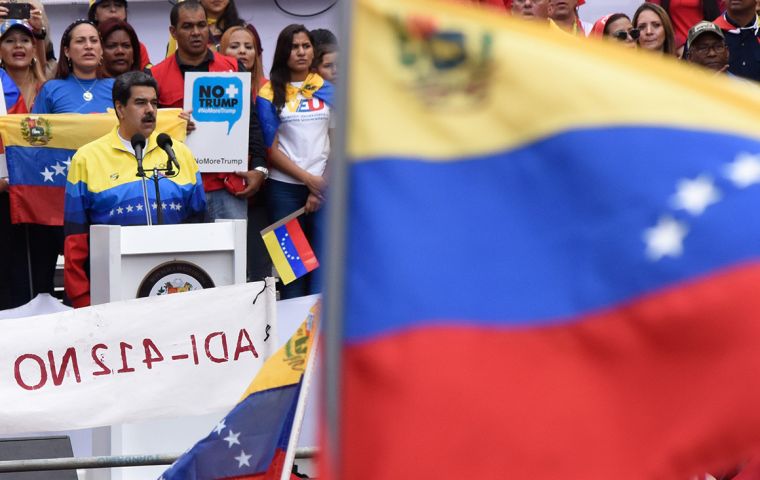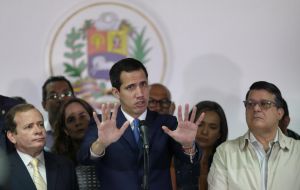MercoPress. South Atlantic News Agency
US changes policy, supports negotiations in Venezuela, a transitional government and fresh elections
 United States has not opposed past talks in Venezuela but had taken a hard line, saying they should only discuss the exit of authoritarian President Nicolas Maduro.
United States has not opposed past talks in Venezuela but had taken a hard line, saying they should only discuss the exit of authoritarian President Nicolas Maduro.  Nearly a year after declaring Maduro illegitimate and recognizing opposition leader Guaido as interim president, Pompeo indicated a greater openness to diplomacy
Nearly a year after declaring Maduro illegitimate and recognizing opposition leader Guaido as interim president, Pompeo indicated a greater openness to diplomacy The United States on Thursday threw its support behind negotiations in Venezuela, saying talks could establish a transitional government, lead to fresh elections and bring an end to the crisis.
The United States has not opposed past talks in Venezuela but had taken a hard line, saying they should only discuss the exit of authoritarian President Nicolas Maduro.
Nearly a year after declaring Maduro illegitimate and recognizing opposition leader Juan Guaido as interim president, Secretary of State Mike Pompeo indicated a greater openness to diplomacy to end the long-running standoff.
“A swift negotiated transition to democracy is the most effective and sustainable route to peace and prosperity in Venezuela,” Pompeo said in a statement.
“Negotiations could open the path out of the crisis through a transitional government that will organize free and fair elections,” he said. Pompeo called for both presidential and legislative elections by the end of the year.
“2020 presents the opportunity to provide the Venezuelan people with what they have been demanding for years: genuinely free and fair Presidential and National Assembly elections to choose their leadership and begin the long process of renewal,” he said.
Maduro won a new term in 2018 in elections that were widely criticized internationally as fraudulent, and new presidential polls are not due until 2024. But elections must take place within 2020 for the National Assembly, the only institution controlled by the opposition.
The United States and more than 60 other countries consider Guaido to be the interim president because of his leadership of the National Assembly.
This week, he won a new one-year term this week after chaotic scenes when troops initially barred him from entering Congress and a rival lawmaker claimed to have won the post.
Norway has mediated talks between Maduro's and Guaido's representatives, but the meetings broke down in August.
Maduro subsequently held “national table” discussions with fringe opposition parties, talks that Guaido's main opposition and Western powers denounced as not inclusive enough to be relevant.
Despite sweeping US sanctions and a collapsing economy from which millions of Venezuelans have fled, Maduro maintains power with the support of the military as well as Russia, China and Cuba.




Top Comments
Disclaimer & comment rulesCommenting for this story is now closed.
If you have a Facebook account, become a fan and comment on our Facebook Page!